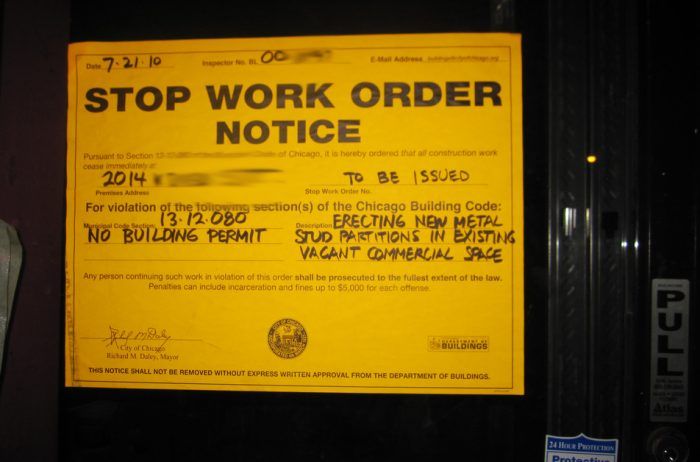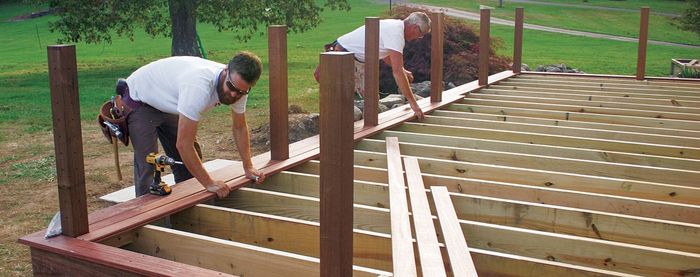Do You Need a Building Permit?
Only your local building official can say for sure, but you better check before you start to work.

Unless you live in a remote community with little to no municipal supervision and no enforceable building codes, you almost certainly will need a permit in order to build a new house or undertake a major renovation.
A building permit is typically issued after a code-enforcement officer has a look at the construction drawings you have submitted and makes sure your plans meet local building codes and other ordinances. You’ll no doubt be paying a fee to the town hall. Once the permit is posted on the job site, construction may begin.
Of course, it’s not always that simple. Depending on where you are, getting a building permit can be a months-long slog involving multiple reviews by multiple overseers, some of them of the nitpicking variety. If you live in an historic neighborhood, reviews can be especially painstaking and involve the smallest building details. Local building offices may be stretched to the breaking point with too few inspectors for too many applications, adding months to the construction schedule.
In a small town, the process may be far less of a hassle, involving one or two visits to the local building office and a relatively short review period. It all depends on where you live. The experience you’ve gained in one locale may mean nothing in another.
Building permits generate a lot of data
Locally, building permits serve several purposes. Most important, they help guarantee that new construction will be safe. An overall review before construction starts and site inspections at specific construction milestones are intended to weed out wiring, plumbing, and construction errors. In towns and cities that have adopted newer versions of the International Energy Conservation Code, building permits also nudge homeowners and builders toward greater energy efficiency.
Building permits generate a little money for the town or city, at least partly offsetting the cost of code enforcement.
Permits also can be used to control the rate of growth, helping communities rein in spending for schools, roads, and other municipal services. In one small Maine town a few years ago, for example, a total of eight permits were made available for the entire year. Ten people were standing in line when the doors at Town Hall opened at 6:30 a.m. on Jan. 2. The first three people in line scooped up all available permits, so seven people went home empty handed. That’s an emphatic way to keep a community small.
Permits also generate a lot of statistical information. They give banks, the U.S. Census Bureau, economists, and others a good idea of what’s being built where, and how much the construction is worth. Single-family building permits are a key economic indicator.
The small jobs are the most confusing
It’s generally true that you can’t legally build a new house without a permit, but repairs, renovations and other changes to an existing house are another story. What’s permitted in one municipality without a permit requires a permit in another. You just have to ask.
As Lydia Lee explained in this report, the city of Chicago requires a permit to change windows or doors if you live in a historic district. In Sunnyvale, California, you need a permit to replace kitchen cabinets. In one Florida community, you might need a permit to set ceramic tile. But in many rural areas with lax or no enforcement, homeowners may skip a permit altogether.
The consequences of skipping a permit
While structural, electrical, and plumbing work usually requires a permit, it can be a close call. Let’s suppose you’ve purchased a house with a detached garage. At some point in the past a former owner cut the electrical service to the building. You want to reconnect it — a fairly simple job. If you go to City Hall and pull a permit, that will be $80. But all you’re doing is fixing something that at one time was already there. Is that permit-worthy?
Homeowners who skip a permit for a significant job — adding an in-law apartment, for example, or building a new deck — may find themselves in hot water later. When the property is sold, the buyer’s lender will schedule an appraisal, and a good appraiser will discover any unpermitted (illegal) work that has been done.
The town may require a permit retroactively, as well as any fees that should have been paid in the first place. There could be a fine. In a worst case for the homeowner, an offending structure may have to be dismantled or completed work taken apart.
What if faulty work undertaken without a permit leads to a fire? The homeowner’s insurance company would be unlikely to cover the damage if they learned no one had applied for a building permit.
In short, there are many risks and few rewards for plowing ahead without talking to the local building inspector.
“Not worth the risk, in my humble opinion,” as one Reddit poster puts it. “Pay for the permits and ask them how to help you [e]nsure that this is done safely… They are not there to make your life miserable. They are there to protect you, and to protect your family.”
Image: Daniel X. O’Neil on Flickr
Fine Homebuilding Recommended Products
Fine Homebuilding receives a commission for items purchased through links on this site, including Amazon Associates and other affiliate advertising programs.

8067 All-Weather Flashing Tape

Reliable Crimp Connectors

Handy Heat Gun






View Comments
A permit to replace kitchen cabinets? to install tile? In what world are these things creating an impact such that a permit is needed? Perhaps there could be some need for a inspector if there are related issues, such as electrical work, but it can also mean hamstringing any project, and of course driving up costs?
One important overlooked point of this article is that a permit is no gurantee of a quality job. In fact, it may be a gurantee of sub standard work.
Never foget the that the contractor and code enforcement may have relations in the color of green paper.
To accept the idea of building permits is to accept the idea that you can never truly own property. If I need the permission of someone else to do something then whatever I'm doing that something to is not mine. See Eric Peters Autos articles, https://www.ericpetersautos.com/2019/03/09/property-taxes-and-slavery/ and https://www.ericpetersautos.com/2019/02/21/our-rights/ , both of which reflect my views on the to get a good idea of what I think of building permits and property taxes. If property taxation was non-existent there would most likely be no need for building permits. But, then again there are always those who believe they are more knowledgeable than everyone else and should be in charge of us lessers.
Simply put - taxation is theft and requiring permits is coercion!